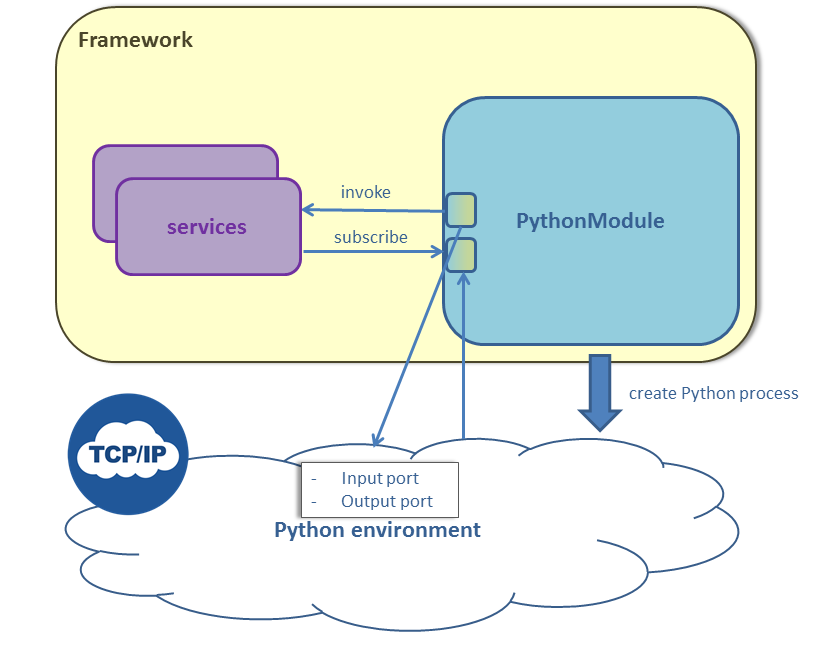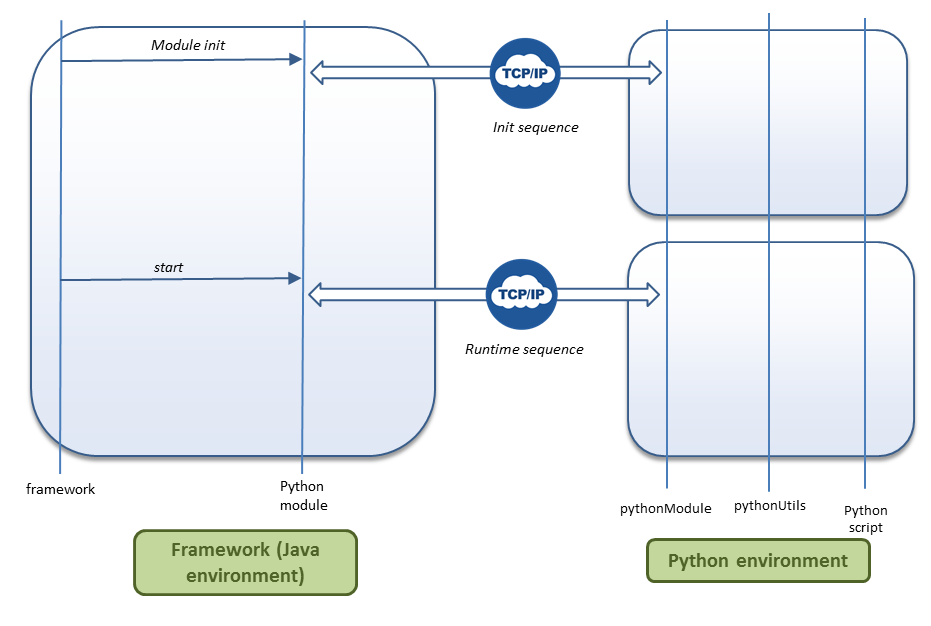Home
Categories
Dictionary
Glossary
Download
Project Details
Changes Log
What Links Here
FAQ
License
Python modules
1 Overview
2 Initialization and runtime sequence
2.1 Using lengthy methods for the Python scripts
3 Python framework
4 Deployment
5 Declaration
6 Types limitations
7 Python module implementation
7.1 waitAtStart
7.2 Python runtime
7.2.1 Usage with Anaconda
7.3 Python environment variables
7.4 Python class name
7.5 Python module implementation constraint
8 Interfacing with the services
9 Defining module properties
10 Debugging Python modules
11 Python compatibility
12 Python library
13 Notes
14 See also
2 Initialization and runtime sequence
2.1 Using lengthy methods for the Python scripts
3 Python framework
4 Deployment
5 Declaration
6 Types limitations
7 Python module implementation
7.1 waitAtStart
7.2 Python runtime
7.2.1 Usage with Anaconda
7.3 Python environment variables
7.4 Python class name
7.5 Python module implementation constraint
8 Interfacing with the services
9 Defining module properties
10 Debugging Python modules
11 Python compatibility
12 Python library
13 Notes
14 See also
Python modules are modules which are scripted in the Python scripting language. There are two kinds of Python modules:
Python modules allow to execute Python code in any Python 2 or Python 3 environment:

Two generic additional Python scripts are necessary to handle the communication between the Python module and the Python script:
Note that these two modules are valid:
The initialization and runtime sequence of Python scripts follows two general phases:

The Python script is not executed in the JVM, but the framework will look for a Python executable on the Platform, or the user can specify the path of the Python executable.
For UDP modules:
The
It is possible to override the general Python executable path defined for the framework in the configuration by specifying the optional
For example:
If you use the Anaconda version of Python for a Python module, you should set the environment path to pass to the python process, or else you may have errors when trying to import some packages such as NumPy.
You have two ways to get rid of these errors:
The module is free to contain other classes as well.
For example:
For example:
As for all scripts, the framework help debugging the Python scripts by showing the Python StackTrace in case of an execution error in the script.
The
The Python modules version is provided by the Framework as a launch argument when starting the Python process. The
In order for the Python script to work properly, you must copy two additional Python scripts which will be used as a library in the same directory as the script itself:
Note that you must use the correct version of the Python scripts depending on the version of Python you intend to use. See generating a Python library more information.
- Modules which communicate with the associated Python script using UDP sockets
- Modules which communicate with the associated Python script using http requests
Overview
Main Article: Python modules overview
Python modules allow to execute Python code in any Python 2 or Python 3 environment:
- A Python module creates a Python process using the Python executable path defined in the framework properties. By default the framework will look for a Python 2.x executable among the applications installed on the System
- services reception from the Python module will be deferred to the associated Python script using an UDP or http communication
- services invocation from the Python script will be deferred as a Python module Service invocation using an UDP or http communication

Two generic additional Python scripts are necessary to handle the communication between the Python module and the Python script:
- The
pythonModule.py(orpythonHttpModule.py) script is responsible for the Services subscription in the Python environment - The
pythonUtils.py(orpythonHttpUtils.py) script is an utility script usable by the user Python script
Note that these two modules are valid:
- For both a Python 2 or Python 3 environment for UDP communication
- For Python 3 environment only for http communication
Initialization and runtime sequence
Main Article: Python initialization and runtime sequence
The initialization and runtime sequence of Python scripts follows two general phases:
- The initialization phase: this phase takes place during the module initialization
- The runtime phase: this phase takes place after the module start
It can be the case if the Python script takes too much time to start-up, or if there is an exception during the initialization of the script
, then the Python module initialization will be aborted. Else the runtime phase will be started.
Using lengthy methods for the Python scripts
Main Article: using lengthy methods for the Python scripts
Python framework
Main Article: Python executable path
The Python script is not executed in the JVM, but the framework will look for a Python executable on the Platform, or the user can specify the path of the Python executable.
Deployment
These modules do not need a deployment in their parent application because they are scripted.Declaration
These modules are declared by the top-levelpythonModule element. For UDP modules:
<pythonModule name="FlightManagementSystem">For http modules:
<pythonHttpModule name="FlightManagementSystem">
Types limitations
Main Article: Python modules types limitations
- Python UDP modules have two ways of exchanging data between Java and Python depending on the Python executable version. See Python UDP modules for more information
- Python TCP modules only use Python 3. As there is a JSON library included in the Python implementation, so the exchange of Data is performed using the JSON format. There are no limitations on the types which can be exchanged with Python modules, including types complex types
Python module implementation
ThepythonImplementation element declares the Python script file which implements the script, and specified associated properties. The content of this element depends of the type of Python module:
waitAtStart
The
waitAtStart attribute specifies the maximum duration to wait for after the start of the Python script. This is necessary to allow the Python executable to start-up. By default the duration will be specified as 200 ms if not defined.
Python runtime
Main Article: Python runtime
It is possible to override the general Python executable path defined for the framework in the configuration by specifying the optional
pythonRuntime element. This element has two possible attributes:- "path": for a Python path to use for the Python executable. Note that if the path is a symbolic link linking to a real Python executable, the framework will follow this link.
- "env": for an environment variable to use to start the Python executable[2]
It is often useful to use this on Unix systems
For example:
<pythonModule name="FlightManagementSystem" > <pythonImplementation path="pythonAppli" inputPort="6000" outputPort="6005" inputSize="1024" outputSize="1024"> <pythonRuntime path="C:/Program Files (x86)/Python24/python.exe" /> </pythonImplementation> </pythonModule>or:
<pythonModule name="FlightManagementSystem" > <pythonImplementation path="pythonAppli" inputPort="6000" outputPort="6005" inputSize="1024" outputSize="1024"> <pythonRuntime env="python24" /> </pythonImplementation> </pythonModule>
Usage with Anaconda
Main Article: Usage with Anaconda
If you use the Anaconda version of Python for a Python module, you should set the environment path to pass to the python process, or else you may have errors when trying to import some packages such as NumPy.
You have two ways to get rid of these errors:
- Add the Anaconda paths to the
PATHenvironment variable - Specify that the Python runtime is an Anaconda runtime. This is the most simple way to use Python scripts when using Anaconda
Python environment variables
It is possible to specify environment variables which will be passed to the Python process[3]
By default the environment variables will be those defined for the Java protoFramework process
. All the environment variables have to be defined under the systemEnv element:- The
envchildren allow to define regular environment variables - The
envPathchildren allow to define environment variables which define a directory or file path. The parser will make sure that the corresponding paths will be converted to absolute paths, even if the paths are defined relative to the directory of the Python script. - The
appendattribute specifies if the path will be added to the current value of the environment variable or if it will replace it
<pythonModule name="FlightManagementSystem" > <pythonImplementation path="pythonAppli" inputPort="6000" outputPort="6005" inputSize="1024" outputSize="1024"> <systemEnv> <env key="MYENV" value="toto" /> <envPath key="PATH" path="toto.xml" append="false" /> <envPath key="PATH" path="titi.xml" append="true" /> </systemEnv> </pythonImplementation> </pythonModule>In that case, the values for the
MYENV and PATH environment variables will be:MYENV=toto PATH=<path of the applications.xml parent directory>/toto.xml;<path of the applications.xml parent directory>/titi.xml
Python class name
By default the module must contain at least one class which must have the same name as the module file itself[4]
Minus the first character which must be upper case
. For example, if the file name is myPythonAppli.py, then the path parameter must be myPythonAppli, and the class defined in the module must be named MyPythonAppli.The module is free to contain other classes as well.
For example:
<pythonModule name="FlightManagementSystem" id="1" > <pythonImplementation path="pythonAppli" inputPort="6000" outputPort="6005" inputSize="1024" outputSize="1024"/> </pythonModule>and:
from pythonUtils import PythonUtils class PythonAppli:However, it is possible to specify the name of the class to call in the module by using the
className parameter.For example:
<pythonModule name="FlightManagementSystem" id="1" > <pythonImplementation path="pythonAppli" className="FMS" inputPort="6000" outputPort="6005" inputSize="1024" outputSize="1024"/> </pythonModule>and:
from pythonUtils import PythonUtils class FMS:
Python module implementation constraint
For the moment, there is one limitation on the way the module should be implemented:- The module must import the
PythonUtilsclass in thepythonUtilsmodule
Interfacing with the services
See Python modules service interface.Defining module properties
See module properties configuration.Debugging Python modules
Main Article: Python modules overview
As for all scripts, the framework help debugging the Python scripts by showing the Python StackTrace in case of an execution error in the script.
Python compatibility
Main Article: Python modules version
The
pythonModule.py and pythonUtils.py scripts must change when the communication between Java and Python is upgraded.The Python modules version is provided by the Framework as a launch argument when starting the Python process. The
pythonModule.py script check if its own version is compatible with the version proviced by Java. This means that you normally should replace the pythonModule.py and pythonUtils.py scripts if the Python modules version changes.
Python library
Main Article: Browser
In order for the Python script to work properly, you must copy two additional Python scripts which will be used as a library in the same directory as the script itself:
- The
pythonModule.py(orpythonHttpModule.py) script - The
pythonUtils.py(orpythonHttpUtils.py) script
Note that you must use the correct version of the Python scripts depending on the version of Python you intend to use. See generating a Python library more information.
Notes
- ^ It can be the case if the Python script takes too much time to start-up, or if there is an exception during the initialization of the script
- ^ It is often useful to use this on Unix systems
- ^ By default the environment variables will be those defined for the Java protoFramework process
- ^ Minus the first character which must be upper case
See also
- Python modules overview: Python modules are modules which are scripted in the Python scripting language
- Python initialization and runtime sequence: This article explains the initialization and runtime sequence of Python socket modules
- Python modules types limitations: This article explains the types limitations for Python modules
- Debugging scripts: This article explains how to debug Python or Groovy scripts
- Modules types: This article is about the modules types which are supported by the framework
- Python tutorial: The Python tutorial is based on the first tutorial, but one of the modules is implemented in Python
- Second python tutorial: The second Python tutorial is based on the first Python tutorial, but with one start method
×
![]()
Categories: concepts | python